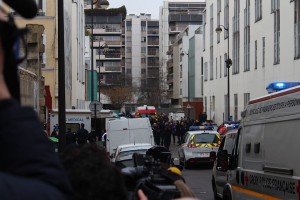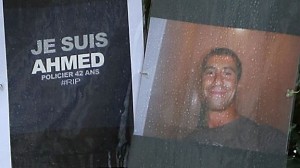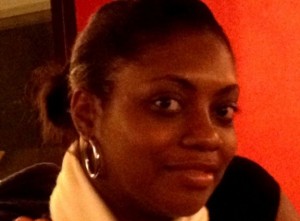Whatever else we say about the murders of the cartoonists at Charlie Hebdo we must insist that this was not a victimless crime; we must also insist that it was committed by criminals. A clash of metanarratives might have put guns in Chérif and Saïd Kouachi’s hands; but it takes a peculiar hatred to shoot an unarmed woman in the head. The visceral bloodlust which motivated the Kouachi brothers is as old as Cain.We must remember that both the means and end of terrorism is mere terror; however they excused themselves, these killers were pursuing little more than recognition and power. Political capital can only made from terrorism by strategists and propagandists; the bloodbath itself sates more immediate needs.
 Still, those strategists and propagandists directed the Kouachis towards a particular target. Only nation states have the resources to unleash indiscriminate violence on entire populations; terrorists must choose their targets with some care. Artistic freedom is one of the few absolutes uniformly recognized by our social elites: by targeting Charlie Hebdo, Islamists have desecrated what little sacred ground is left in a secularized culture. Some have suggested that an attack on satirists was an attack on the heart of liberal democracy. That overstates the case; many of Charlie Hebdo’s caricatures would not have been published in liberal democracies in the first half of the Twentieth Century.
Still, those strategists and propagandists directed the Kouachis towards a particular target. Only nation states have the resources to unleash indiscriminate violence on entire populations; terrorists must choose their targets with some care. Artistic freedom is one of the few absolutes uniformly recognized by our social elites: by targeting Charlie Hebdo, Islamists have desecrated what little sacred ground is left in a secularized culture. Some have suggested that an attack on satirists was an attack on the heart of liberal democracy. That overstates the case; many of Charlie Hebdo’s caricatures would not have been published in liberal democracies in the first half of the Twentieth Century.
True, the freedom to criticize any set of ideas without fear is essential to liberal democracy. But France does not see freedom of speech as an absolute good and has felt the need to restrict some forms of expression (religious symbols are largely excluded from public life and hate speech is criminalised). And we easily forget that freedom of speech depends as much on civility as it does on the protection of the law. Civility requires self-restraint; that we respect others in word and deed. It is arguable that Charlie Hebdo respected the law but not the persons it satirized. Whatever the artists meant to achieve, some of their art was offensive and puerile; their message desecrated an image of Muhammad and thereby dehumanized Muslims. But we do not explain the Paris attacks by noting that Muslims were deeply hurt and offended.
If I am angered, I might well respond in anger; but that response will come in the form of words and arguments. To argue that violence was the inevitable response to Charlie Hebdo’s blasphemy is a deeper insult than the blasphemy itself. It is to suggest that all Muslims reject democratic norms; that no Muslim has the wit, the wisdom, or even the the desire to mount a rational defence of the Islamic faith. But although they are in danger of being swept into a cultural ghetto by the actions of the terrorists and our panicked response, many Muslims state their case with depth and clarity. In any case, Islam is not a single unit and not every righteous Muslim has the same attitude to liberal democracy.
 Too many secularists and Christians discover the ideals which define militant Jihadism and then leap to the conclusion that these doctrines reveal the true nature of Islam. This critique of Islam functions as a powerful polemic, but it is a poor apologetic and a terrible political response. It does no more than reassure Christians who feel displaced and besieged in a post-secular, multi-cultural age. In fact, it isn’t even clear that militant Jihadists share the same motives. They belong to different organizations and operate on different continents. Our search for the simplest explanation leads us to oversimplify the evidence.
Too many secularists and Christians discover the ideals which define militant Jihadism and then leap to the conclusion that these doctrines reveal the true nature of Islam. This critique of Islam functions as a powerful polemic, but it is a poor apologetic and a terrible political response. It does no more than reassure Christians who feel displaced and besieged in a post-secular, multi-cultural age. In fact, it isn’t even clear that militant Jihadists share the same motives. They belong to different organizations and operate on different continents. Our search for the simplest explanation leads us to oversimplify the evidence.
Thoughtful Muslims understand that “freedom of expression” is a moral challenge as well as a political freedom. They know that in a free society, we must learn to speak with maturity and charity even though the law does not compel us to. Democratic freedoms are not an invitation to decadence; they demand tolerance and virtue. If the state does not force us to live wisely and in peace we must do so of their own accord. Liberal democracies place greater demands on the believer, not less, and they are places where faith can flourish.
Of course, some Islamic communities hold beliefs which are not compatible with liberal democracy and these communities need to be challenged. But it would be sheer hubris not to learn from their Islamic critics. Ziauddin Saradar, for example, rejects the “weaponised faith” of The Muslim Brotherhood, ISIS and Al Quaeda as irrational, anti-religious and self-destructive. Those who weaponise their faith are immune to reason: they possess a supreme self-confidence which is the antithesis of faith (and a Christian can agree Sardar that true faith must involve humility). They are incapable of questioning anything they believe: in effect, they never doubt their own piety or reason. They eliminate self-criticism as ruthlessly as they eradicate their enemies.
 Weaponised faith is self-destructive because it needs enemies to justify its own existence. If ISIS ever smashes the American Satan and drives imagined crusader states into the sea it will find new enemies within the Ummah. Eventually, in their relentless drive for purity, the holy warriors will turn on one another. In many ways, they are the greatest danger to the international Islamic community, which is essentially diverse. Some Muslims believe that Islam should conquer the world; others, believe that Muslims should renounce it, and follow a quietest or mystical path.
Weaponised faith is self-destructive because it needs enemies to justify its own existence. If ISIS ever smashes the American Satan and drives imagined crusader states into the sea it will find new enemies within the Ummah. Eventually, in their relentless drive for purity, the holy warriors will turn on one another. In many ways, they are the greatest danger to the international Islamic community, which is essentially diverse. Some Muslims believe that Islam should conquer the world; others, believe that Muslims should renounce it, and follow a quietest or mystical path.
Of course, Christian apologists might argue that Muslims will find it easier to weaponise their faith than Christians. Islamic texts can offer more comfort to the holy warrior than the Gospels or the letters of Paul. Paul and Jesus rejected violence as a means of advancing the Kingdom of God; this cannot be said of Muhammad and Islam. Even if we allow that the most reliable information about Muhammad comes from the Quran (and not the Hadith, and certainly not the later biography of Ibn Ishaq) it is clear that Muhammad was prepared to use force to advance Islam. Indeed, it seems that he was a capable military commander.
Perhaps Islam must contend with the “seeds of violence” within its texts, traditions and history; but those seeds need to be nurtured in fertile soil. We cannot pretend that these ‘seeds of violence’ do not require social, political and economic realities to grow. And human beings, not texts, go to war; it is humans who choose to elevate one text over another. The ultimate explanation of “Islamic terrorism” is not to be found in a faceless abstraction like “Islam”, but in Cain’s savage passion to violently defend his own righteousness.
.
